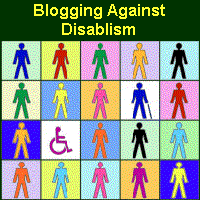Sunday, December 31, 2006
Gill
Gill was so full of energy - where has that gone now?
She was Director of B Arts from the start in 1985 when they were a co-operative, and what a wonderful organisation they are now.
She was a Loud Mouth Woman and that is how I will remember her - the last time I saw her we were singing the bass line together.
Thanks for your voice, your laughter and your energy Gill.
Friday, December 29, 2006
3 days a week....
I am still waiting for my written job offer, but the 2nd choice candidate has agreed to take the job share..... I should be able to start in February. I never got a new contract from the NHS when I started this new job despite chasing them for it twice, so I'm still on one month's notice!
I'm not sure about research yet, but I do know the holiday entitlement is more than I get now and the pay is slightly more pro rata.
All in all it's a fantastic deal and opportunity - I intend to make the most of it.
Amongst my plans for what to do with my other 2 days a week are:
- get away a lot in the campervan that we have recently acquired...
- volunteer at the local self-advocacy project that I have been working with a lot
- act as broker for a young person and their family to take control of Self Directed Services
- take a lot of photos - hopefully getting paid for some of it - with Cultural Sisters and other local community arts organisations
- take up drawing again
- make lots of music and sing
- walk and swim
- re-launch froom
- support Pan the local group that I am a member of to develop and seek funding
- blog....
Think I might struggle to fit it all in but I'll give it a try!
Sunday, December 03, 2006
working hours.....
I have been offered a new job as a lecturer at the local Uni and I am taking part but I am in the process of negotiating hours.
I work 4 days at the moment. I do not want to go back to full-time -
- I got so worn out last year I have got used to needing a 3 day weekend to keep my batteries fully charged.
- T has a condition that means I am his carer some of the time and I like being around at home - it stops him getting too isolated.
- I want to do other things with my time than be employed in one job.
I do some voluntary work and some paid self-employed work e.g. photography. I'd like to do more of both if poss. I'm keen to get froom going properly too.
So I have been worrying about this. Can I cope with a full time job? I believe that I would be able to work from home sometimes and the hours would be flexible.....
I will not get too anxious about it until I know if the other candidate can job share........ should know by mid week.
Friday, November 17, 2006
interviews with inspiring women.....
I posted about the Fawcett society a couple of weeks ago and now the Guardian have put sound clips on their site of interviews with the four women who are going to be speaking at the Fawcett society event on the 22nd November.
There is also a very interesting article in the same paper with 5 women - all writers - Jenni Murray (who will be chairing the Fawcett event), Ariel Levy, Lionel Shriver, Maggie O'Farrell and Michele Hanson, writing about the women who have inspired them.





check up on your boyfriend.....
the British Government is considering allowing single mothers to ask for information about the criminal record of new boyfriends to find out whether he is a sex offender if they are worried.
The Guardian make it clear that "Mothers would have to have grounds for suspicion and would face tough penalties if they abused the information, including by making it public. Establishing a relationship with a single mother is a common strategy used by predatory paedophiles to gain access to children. Such men represent about a fifth of child sex offenders; the rest are relatives or otherwise known to the victim."
This seems to me like such a terrible indictment of the state of our community - we cannot trust men with our children. Why is this? Why are men attracted to children as sexual playthings? Is the only way to deal with this issue to give responsiblity to women check up on men we have doubts about? There must be another way of reducing the chances of child sex abuse.
Along with violence against women, abuse of children is a symptom of the patriarchy - men need to feel powerful and to express their feelings as agression or sex. If they need to feel close to a person sexually some of them seem to need that person to be non-threatening - e.g. a child. 80% of child sex offenders are relatives or otherwise known to the child.
Monday, November 13, 2006
workplaces need to change.....
now that's a surprise! (not)
According to a Guardian article today Jill Treanor says "Senior executives from 150 leading companies will be asked to help draw up a new set of industry standards to promote more women and to create working environments which break away from the traditional male-dominated, aggressive workplaces"
The number of women in the boardrooms of Britain's biggest companies has fallen sharply. While 50% of the graduate recruits are female, the proportion reaching senior levels falls to 30% and to just 15% in executive roles. There are only 12 female executive directors at FTSE-100 companies last year - down from 20 last year. The 12 women work for 10 companies. Only three FTSE 100 firms have women chief executives. 90 women serve as non-executives, but more than a quarter of FTSE 100 firms have no female director.
Yup - there's a lot of work to do!
Professor Lynda Gratton, leading the research says "It ís not simply that companies [are choosing] not to promote women but that women decide to leave". One of the first things the centre will do is to bring together all relevant research on its website, london.edu/womeninbusiness Then it has plans for studies into topics such as what draws women to entrepreneurialism and the reason women seem to be good at innovation.
In an interview in the Guardian last week Gratton said "We need to show organisations, through research, what benefits women can bring, what they can do.....
Research published this Wednesday also found that women were both task- and relationship-oriented, meaning, in lay terms, that they get things done as well as get on with people. Gratton describes this as a "huge finding". I think it's totally patronising - women have to be doers and networkers to survive with a family to support, it's not news!
This week's research suggests that more than 30% of any workforce needs to be female to change an organisation. Women are surrounded by fewer and fewer women as they move up the greasy pole. Gratton also points out "Being a minority is an unpleasant place to be. The surprise I sometimes think is not that there are so few senior women but - given how hard it is and how extraordinarily good they have to be - how many." This point that echoes the earlier posts I have written about how women, despite having to spend hours on "beauty-work" can still achieve as much, if not more than our male counterparts, if we choose to.......
Saturday, November 04, 2006
inspiring women update....
 according the entertaining quiz on Fawcett
according the entertaining quiz on Fawcett I am
Mary Wollstonecraft (1759 – 1797)
She was a British philosopher, often hailed as the first feminist. She wrote several novels, essays, and children's books, but is best known for A Vindication of the Rights of Woman (1792) in which she argued that women were degraded through the lack of education imposed on them by the restrictions of femininity. In line with the ideals of the Enlightenment, she fought for a society based on reason and the new concept of human rights.
As well as writing, Mary Wollstonecraft worked as a teacher, founded a school and travelled all over Europe, staying in France during the revolution. After a stormy relationship with Gilbert Imlay, with whom she had her first daughter Fanny, Wollstonecraft married the philosopher William Godwin. They had a daughter together: Mary Shelley, the author of Frankenstein. Mary Wollstonecraft died of puerperal fever shortly after the birth, but left a legacy of feminism that has changed the world.
I wish!!!!!
 Seriously though - the quiz promotes the work that Fawcett is doing to highlight inspiring women. Inspiring Women celebrates women and their contribution to politics, the arts, entertainment, sports, science, and public life.
Seriously though - the quiz promotes the work that Fawcett is doing to highlight inspiring women. Inspiring Women celebrates women and their contribution to politics, the arts, entertainment, sports, science, and public life.Jenni Murray from BBC Radio 4 Woman's Hour will be in conversation with this year's Inspiring Women in London on 22nd November. The women are: comic actress and writer Jocelyn Jee Esien, double Paralympic champion Tanni Grey - Thompson, Shadow Leader of the House of Commons Theresa May MP, and Liberty Director Shami Chakrabarti.
In August Lucy Clouting of the Guardian profiled inspiring women nominated by readers. They were inundated with responses and chose 15 to profile. "Whether through art, charity, or political protest, all are working ardently to make the world that much better for all of us."
The list includes Katherine Zappone and Ann Louise Gilligan a lesbian couple fighting for their marriage to be recognised in Ireland, and Finn Mackay Founder of the London Feminist Network and domestic violence prevention officer who has rejuvenated women-only Reclaim the Night marches.
Last year the web-based women's network that I set up with some friends locally - Froom , took this topic as our theme and published a few articles here. I'd like to see more contributions but everyone seems too busy. Shame really as reading things like this help me feel the power of women and encourage me to be myself and not succumb to the limitations that I feel our patriarchal society place on me.
women at the top? ...
The R£wards survey from the Institute of Directors (IoD) shows that female executives are still getting paid less than their male colleagues - suprise, suprise - and also work longer hours......
“Although there has been an overall decrease from 24% last year, to 19% this year, this is hardly grounds for celebration. Even those who break through the glass ceiling and reach board level will find there is another roof over their heads. The pay gap has often been justified on the basis that women work shorter hours. Our survey refutes that suggestion. Not only are women directors being paid less, they are also working longer hours.”
Female directors now earns an average of £60, 000 compared with the average male director’s basic pay of £74, 028 and the biggest gaps are in the private services and voluntary sectors where female pay was 25% below that of their male counterparts.
To make matters worse, the research shows that female managing directors in medium and large companies are actually working longer hours than their male counterparts – 51.25 hours per week, (compared with 50 hours for men in small to medium sized companies) and 57 hours a week compared to 55 in larger companies.
Meg Munn MP made a speech in October saying -
"In parliament there have only ever been 291 women MPs. There are more than 500 men there today. That’s nearly 90 years after the time when women could first stand for parliament. Today still less than 1 in 5 MPs are women. Less than 30 per cent of local councillors are women. In business less than 11 per cent of directors of the FTSE companies are women. Only 1 per cent of those in construction trades are women and in 2004 just 22 young women took up plumbing apprenticeships in England compared to more than 3000 young men."
She goes on to say "For public appointments it’s a bit better - 35 per cent are held by women but only just over 6 per cent by ethnic minority women. " However, I read a special supplement in Health Service Journal in September, that I meant to post about a while ago. It listed "the 50 people with the greatest influential on today's NHS policy and practice." Of the 50 - only 9 are women. I found this truly shocking. That is considerably less than the 35 percent (just over one third) that Munn suggests. The list had Patricia Hewitt at number 2 - Secretary of State for Health. Dame Carol Black who is at number 8 - National Director of Health and Work and Gill Morgan at number 15 Chief Executive of the NHS confederation. The other 6 women all come in the bottom half of the list.
The Women and Work Commission was set up to examine the persistent problem of the pay and opportunities gap. Their final report, which came out earlier this year, contained a number of recommendations about the barriers to informed choice at school, combining work and family life, lifelong learning and training, and improving workplace practice. It found that the pay gap between part-time women workers and full-time male workers is 41%.
Meg Munn was promoting the new Commission for Equality and Human Rights. (CEHR) The new Commission for Equality and Human Rights will inherit the powers of the three existing Commissions who focus on equality relating to gender and race and rights for disabled people and will deliver the new Equality Act (2006). It will open it's doors in October 2007. In the meantime the Equal Opportunities Commission continues.
There is certainly a long way to go and the CEHR needs to have a lot of power and support to have any effect on what is clearly an entrenched problem. The new commission says "we want to talk to as many groups, organisations and companies as possible to establish the relationships and engagement that will be essential for the Commission's success. Please contact us if you have any questions on the CEHR during this transition phase, or if you are holding an event and would like a member of the transition team to speak; or you are would like the latest update on the CEHR, please use the form below to get in touch."
Will it challenge the patriarchy I wonder? What do you think?
Stop the Traffik....
WOT NEXT?
1. Get an organisation that you are a part of to become a STOP THE TRAFFIK MEMBER
2. Help with a donation towards the costs of the campaign. And if you are a UK tax payer, your donation can be gift aided as well.
3. BUY FREEDOM KEYS from the STOP THE TRAFFIK website and sell them within your organisation and your community, to your neighbours and friends so the symbol of STOP THE TRAFFIK is carried everywhere.
4. VISIT THE GLOBAL PROJECTS PAGE on the web site and see over the coming months what organisations are doing around the world to STOP THE TRAFFIK.
You could adopt and raise funds for one project.
5. GO TO THE 'HOW TO GET INVOLVED' SECTION on the website and search through the ever growing list of ideas of other ways to get involved in STOP THE TRAFFIK.
6. TAKE TIME TO VISIT THE WEBSITE REGULARLY and see what else is going on and let us know what you are doing onto the feedback page.
STOP THE TRAFFIK. UNLOCK FREEDOM.
articles wanted ....
The theme of the first FF is future of feminism - a lessons learned and now to proceed further.
Mirjana Tejic is a new member of the uk feminist action group on yahoo and she is inviting women to send short articles (2000 - 2500 words) by the 25th November.
Mirjana is a feminist legal researcher from Serbia, Belgrade and is legal representative of Center for prevention of domestic violence. E-mail her on tejic AT eunet DOT yu if you are interested.
Saturday, September 16, 2006
bathing beauties.....
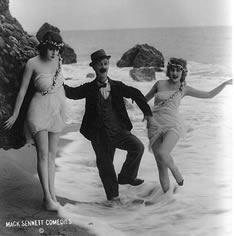 ....are believed to be the first women shown on the big screen with armpits on show - shaved. That was in the Mack Sennett silent films. Thanks to partykillgirl for the information.
....are believed to be the first women shown on the big screen with armpits on show - shaved. That was in the Mack Sennett silent films. Thanks to partykillgirl for the information.She says "The first moviemaker to show the feminine armpit extensively in non-pornographic films was Mack Sennett, in his Bathing Beauty shorts… ..early movie stars like Theda Bara and Mack Sennett's Bathing Beauties shaved their legs and armpits, supposedly because Sennett preferred that look."
This is the best image of this "beauties" I can find on the web.
At least they are not starved skinny models!
Partykillgirl's excellent blog parodies lad's mags using images of naked men instead of women to re-create front pages to great effect. This is with the intent of pointing out how lad's mags should be on the top shelf along with similar material aimed at gay men - clearly porn.
Sunday, September 03, 2006
why women?
The why women? website is stuffed full of fantastic resources -
why women? campaign – our calls to government
why women? report - the full and summary version with evidence of funding crises for women's organisations
why women? film - soon to be released
Timeline - a brilliant resource for any women's group or school ,also available in Word
Poster - a beautiful pdf poster with amazing images and facts and figures.
Postcards - 6 great images
Statistics about women - another brilliant set of information, also in Word
Research on women’s organisations - WRC's research
You can find out if your MP is signed up to the Early Day Motion and if not, email them a letter based on a template provided on the why women? website.
Write a letter to the media or feature the campaign in your newsletter or magazine...
What have women's organisations ever done for you? ......Plenty sister!
Wednesday, August 30, 2006
feminist theatre......
The Vagina Monologues and Oleanna are coming to town.
The Vagina Monologues is for one night only, the Oleanna is on for 2 weeks.
I have posted about both on froomblog.
The Vagina Monologues is very populist theatre and can fairly easily be seen as light entertainment, rather than feminist theatre. I saw it last year at the Regent Theatre in Stoke-on-Trent - the acting was rather poor on the whole. Although there are serious moments when the women on stage are telling stories of other women's experiences of rape, sexual violence and oppression, it's the comedy that stands out, and turns it into a "show". I think that's where the message is lost along the way. We need light relief, of course, but, for example, the section of the show where one woman talks about her cunt, was played just for laughs and missed the point.
Oleanna is totally serious playwriting and is challenging for the audience. When I saw it a few years ago it really made me think about gender roles, power, politics, education and other things too. It's being put on at the New Victoria Theatre, a repertory theatre-in-the-round, which is great as they hardly ever stage straight political drama. This season marks the change over from one director to another at the theatre - both women, so I hope this is the start of a new, more political era for them, more like it was when the theatre was the Old Vic in it's old venue.
where did it all start?
 Anonymous thinks it was with an advert for razor blades.
Anonymous thinks it was with an advert for razor blades."It began with the May,1915 edition of Harper’s Bazaar magazine that featured a model sporting the latest fashion. She wore a sleeveless evening gown that exposed, for the first time in fashion, her bare shoulders, and her (shaved) armpits. Shocking at first, this soon caught on. At the same time a marketing executive with the Wilkinson Sword Company, which made razor blades for men, designed a campaign to convince women that underarm hair was unfeminine. By 1917 the sales of razor blades doubled as women conformed to this feminine stereotype of shaving under their arms."
This certianly is an interesting advert that must have come shortly afterwards, for depilatory powder......
Thanks to anon for this research. Can anyone tell us any more?
Tuesday, August 29, 2006
they're like buses....
Since the sad demise of Everywoman (I loved that magazine) there have been no feminist alternative women's magazines except Diva (which is great) which is specifically written by and for lesbians.
So I was really pleased when I read in Travelling Punk's blog that she was keen to start a magazine and wanted others to join her. I got involved a bit, in the early stages, and the result was published a few weeks ago - Subtext.
I was then really suprised to read alongside the review of Subtext on the F-word blog, a review for Uplift! Magazine and another for Vagina Magazine.
Three in one go - that's fantastic as it shows the strength of feeling about the need for something other than the usual "women's lifestyle" mags as they are labelled in supermarkets.
However, I can't help feeling concerned that they may not be sustainable - is there a big enough market for 3? Will they all have enough support to actually produce them?
I hope so, but I am not confident.
I have ordered and now received my copies of all 3. They look very different at first glance. On first impressions Vagina Mag appeals to me the most. I will read them well and get back to you. It'd be great if you would buy them too, and then we can compare opinions...........
Sunday, August 20, 2006
bodytalk.....
I also found this site recently about the real bodies of women after childbirth - the shape of a mother.
It prompted me to take a picture of my own body, complete with it's hair. I thought for a long time before posting one, but I dared, so here is one of my armpits.

I find it quite ugly, yet if this was a man's body, I wouldn't give it a second thought and that is a real challenge. I also struggle to see it the same way I do facial hair, I react postively to moustaches on women in general.
I have done a web search to find blogs or articles about women's body hair. Many that come up are links to advice about removing "unwanted excess" hair. The majority are porn sites for hairy women. That is unsuprising but depressing - if so many people find hairy women attractive and sexy, why is it so taboo?
Polly Vernon in the Observer in January this year stated that "depilatory demands have risen in step with women's position in society. This reminds me of a post I wrote about the link between "beauty" work and women's empowerment.
She reminisces about her own experiences of hair removal as a child. My experience is similar. I started with my eyebrows y mother plucked them for me at first, and progressed to my full leg including toes!
Polly also comments that the "UK hair-removal market is worth £280 million a year, and is growing staggeringly fast" - which will partly explain why we are expected to do it, and it will increase as hair will always grow back!
Saturday, August 19, 2006
petition - brothel sitcom
According to a national press article the show, 'Respectable', features women who sell sex to pay for shoe collections and 'beautiful things'. Click here for more information about the sitcom
Eaves Housing have already written a letter (attached) of complaint and Women's Aid intend to write to Channel 5 too. They are collecting signatures to show that this is not the kind of viewing audiences want.
how to look good naked......
It started off quite well - there are some really good ideas about helping women have a more positive self image. However it soon descended into the usual stereotyping about what is "right" about "beauty".
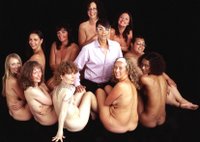
The presenter did a voice over whilst the woman featured had an almost full body wax and he said "you have to do this if you are going to look good naked".
She went for an underwear fitting and the woman who measured her up said she "had to have a good bra". She was also given figure-shaping support tights/ pants to give her "the waist she had not got".
The other big problem I had with the show is that whilst the presenter was talking about the sort of clothes she should be wearing to "give her a waist" the screen showed images of hyper-skinny models on a catwalk with totally unrealistic body shapes.
Then the photo shoot at the end featured the woman in extremely high heels.
I watched it again to see if that was an abberation but it wasn't. It's the standard for the series.
What a disappointment.

I don't deny it's a significant improvement on the usual plastic surgery filled "look good" shows, but there's still a way to go before bodies like mine are reflected on TV. I have difficulty seeing myself as beautiful and I know it's partly because there are no role models for me in the mainstream media.
There's an interesting discussion about the series here.
Sunday, August 06, 2006
clothes - do you look all right in them?
I find this statement ridiculous. We are legally obliged to wear clothes in public in our society. So how come there is an unwritten rule about "looking all right in clothes"? Surely we should not have to worry about looking all right, we should just cover up....
This makes me think about whether it matters if we look all right without clothes.... I know I think heavier, fatter people look better naked than super-thin people, and of course when I say people we are actually talking about women here.
So that's the other question - it's not about whether people look all right in clothes - it's about whether women look all right in clothes. Why is that?
Women buy a lot of clothes, compared to men. That is obvious when you look at what men tend to wear at work in office/ professional jobs - a suit, shirt and tie - the same suit every day, with a few shirts and a couple of ties. When they go out what do they wear - a pair of trousers and a shirt or t-shirt. They are excused from the pressure to dress to show off the clothes.
So women are made to believe they don't look all right in anything, so they have to keep buying to find the right clothes for their shape. They will never find the right clothes for their shape, as clothes are not made to look all right on their shape unless they are super-thin.
I was in a small clothes shop yesterday, my friend wanted to look in there. He buys from them regularly. I looked at the women's clothes. There was only one of each item on the rail, and they were all labelled either S or XS - small or extra-small. There was one top labelled large but it was no bigger than the rest. The tiny t-shirts were around £40 each. I left the shop - I cannot support a retailer who so clearly only wants to sell to thin women. I detest the way that women are supposed to be tiny and men to be large.
Of course we are under pressure to conform to certain stated norms and how we look is one of those. How did it happen that we now believe that we only look all right in clothes if we are thin?
One of the ideas for an answer Mimi proposes is "perverse, but a reverse snobbery now informs our relationship with weight; being thin in an overeating society is a sign of control. It takes enormous will to stay so thin. Nationally, we're getting fatter by a percentage point each year - so people who are trying to lose weight, which means most of us, are in awe of the high achievers in the field." So it's about feeling like we have some control in a society that still does not value women. I can relate to that.
I could use some of my time to challenge the fashion industry but overall it's not about fashion, celebrity or food alone - it's the patriarchy-peddled belief that women are second class citizens and the impact that has on us - we interalise the oppression and it perpetuates the myth. We have to find a way to empower ourselves.
Friday, June 30, 2006
Mad dogs
The event was a valiant effort on behalf of the parents support group at the school to being the community together and tackle some of the racism. I am sure it was done on a very small budget.
The fun-day was far from fun as far as I was concerned, however. The place itself is so depressing - a tall grey building dominated the site and the fence all around made it feel like a prison. We were on the field round the back. The "entertainment" ranged from a bucking bronco machine, to a very poor karoake style act called Alien effects - 2 men who dressed in various costumes (ET - who very few people at the event were old enough to recognise, Men In Black and so on) and sing along to a soundtrack.
There was also a full half hour demonstration to very loud rap music (the PA was crap) by the girls and boys from the Mad dogs kick-boxing team - which I really don't relate to at all - stylised, dancelike poses with fists raised and kicks to music. There were lots of splits, high jumps and back flips too. There were more boys than girls and they were not all white. But.....it felt like packaging an explosive in a shiny box with a pink bow - however you dress it up it's still about fighting. I watched the adults who run the team - they stood around with arms folded across the chests, looking, as I thought, rather smugly self-satisfied. I have to say the young people were highly skilled, very well co-ordinated and super athletic. It is obviously great exercise, they clearly enjoy it, they have won awards for their displays and it "keeps them off the streets", but I just don't like it. So that must be one of my prejudices shining through.
Anyway - regardless of the actual activity - I really hate the name. They are the "British" Mad Dogs and it just makes me think of the British Bull-dog stereotype mentality - all white male aggression. It also equates madness with violence and animals - that really offends me - it is so unhelpful - it just serves to confirm the belief that people who live with mental distress are violent and out of control, which is the opposite in truth - people with mental illness are more likely to be victims of abuse and violence than the average citizen and not perpetrators.
By the way - they are sponsored by a local sausage manufacturer - the connection with offal is a great irony!
Wednesday, May 31, 2006
hairless...
I had a dilemma about it but in the end decided to remove my armpit hair (I have long dark thick hair there). I used hair-removing cream first - I left it on a lot longer than it said to and it still left quite a bit behind. I then shaved the next morning and realised I probably should have just done that in the first place. Interestingly, what with buying the cream and then faffing about with the skin test and then using it and then having to shave to get a full removal - I must have spent about 2 hours on it. It really does take up your leisure time.
I had one reason - I was the bridesmaid for my sister last weekend and the dress was strapless.
I did not think I looked bad - I was worried that all the traditional/ conservative folk at the event might be more interested/ disgusted/ talkative about my pit hair than the beautiful bride. It did mean I was not worried about what people thought, so I was relaxed.
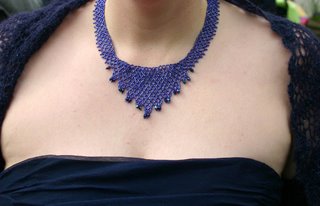 I also wore a tiny bit of make-up - mascara. That was odd - I looked so different when I see photos. I forgot how much it changes you. Basically I felt under pressure to conform, and when I did, it helped me fit in which reduced my anxiety. Complicated eh?
I also wore a tiny bit of make-up - mascara. That was odd - I looked so different when I see photos. I forgot how much it changes you. Basically I felt under pressure to conform, and when I did, it helped me fit in which reduced my anxiety. Complicated eh?My hair's all growing back now, and I felt weird for a day or so, but then got used to it. I might de-hair them again when (if) it gets hot. I don't think there's likely to be another occasion ever when I would do so for appearance sake.
It was a fantastic day. T and I are fairly anti-weddings. We have not really ever been to a good one - except this one - it was particularly personal and relaxed.
It was as weddings go - quite moving and I understood why they were doing it, I think. I was very flattered to be asked to be a witness/ bridesmaid for my sister and her lovely partner, and as I quite like dressing up, I enjoyed the frock!
So - no matter how strong my principles are sometimes it's just too hard. That does not feel very good - in many circumstances oppression is based on prejudice about something that can't be chosen. I was very lucky to be able to choose to change myself temporarily.
Nicola Smith....
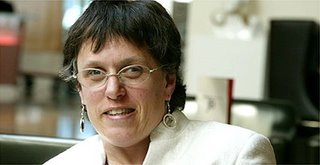 is the new national Co-Director for Learning Disability in the Department of Health. Read an interview with her in the Guardian.
is the new national Co-Director for Learning Disability in the Department of Health. Read an interview with her in the Guardian.She is working with Rob Greig to challenge the social exlusion of people with learning disabilities.
This is the first time that anyone with a learning disability has ever held a senior government post!
One of the main reasons she feels qualified for the post is her experience of living in a hospital for some time. In her words "it was very grim". She is concerned to hasten the closure of all the last hospitals and "campus" NHS homes. Another aim of hers is to address the removal of children from learning disabled parents.
I am looking forward to finding out how she gets on - I also am interested in how the Co-Directors will work together - another first I think.
Sunday, May 07, 2006
how much time do you spend at leisure?
I have just read an article from the Guardian on the 4th May based on a speech given by Germaine Greer about leisure time. There is a big difference between the way men and women use their leisure time. Basically women don't have "leisure" pursuits - we work when we are not doing paid work - either doing housework or volunteering or doing beauty work....some of that is to do with hair.
"The time they don't spend working for the employer and the taxman they spend doing something called "housework", to which, for most women between the ages of 25 and 50, may be added "childcare". There is also the onerous task of body maintenance, keeping the otherwise disgusting female body clean, tidy, deodorised, made up, not to mention toned and becomingly clad, plus the exhausting, sometimes painful and expensive business of hair and hairiness management. Work, all of it.....
Older women, whether they play bingo or break out the camp stove, are heavily involved in leisure, but theirs is cut-price leisure. They are not in the market for recreational vehicles, or powerboats, or even motel accommodation. They are the people who make possible literary festivals and antique fairs, who support local art galleries and museums, who volunteer for every community chore, and happily raise money for what they believe to be good causes, giving, giving, giving of their time free. If we had a way of quantifying the output of the leisure industry of older women, we would probably see that it contributes vastly more to the GDP than the corporate leisure industry."
I spent such a large part of my life dealing with hair from puberty until my mid 20's that I feel certain one of the reasons I now have time for real leisure, such as singing in the LoudMouth Women singing group I am part of, is because I don't remove hair anymore. Neither do I wear any make-up. How many hours do you think you spend "working" on your body image?
Saturday, May 06, 2006
IRIS
- the initiation of conferencing, publishing, exhibiting and educational projects within the field of contemporary women’s’ photographic practice, and
- broadening access to the medium through books, exhibitions and educational activities.
Today was the launch of an exhibition curated by IRIS called Masquerade, at the Potteries Museum and Art Gallery. Masquerade brings together the work of 7 women photographers from Britain and the USA, and features all kinds of contemporary portraits. The show also compares photographs in Masquerade with paintings from the Museum's collections.
The show has already been in London and Birmingham. It is heartening to see an exhibition of national significance led by Staffordshire/ Stoke-on-Trent women and organisations.
There are some challenging pieces - one artist photographed her mother in her last months with Alzheimer's. The 6 portraits of women with moustaches are truly beautiful. Apparently when the exhibition was in the MAC in Brimingham there were complaints about these portraits including "disgusting". Why do openly hairy women offend people so much?
Masquerade is on until the 9th July. Get there if you can.
Saturday, March 25, 2006
top shelf voluntary code
The "new code of practice relates also to so-called 'lads mags' as well as tabloids and other news publications. It stipulates that these types of publications should be displayed out of sight and reach of children and be separate from children's titles."
Diane says "these new guidelines are a victory for parent power and for gender equality. It also shows that public attitudes are changing and that era of normalising sexual or exploitative images of women is no longer considered acceptable."
I think she is over-egging the pudding here a little - too many people find this more than acceptable - that's why people like us have to press for limits and rulings if we are to see real change.
Diane concluded: "I am very pleased that new codes of practice are to be published, but a voluntary code is only sufficient if it is adhered to". I will keep a close eye on developments to make sure that this good practice is in fact implemented. If the code proves ineffective I will push for a statutory instrument requiring newsagents to sell titles containing pornographic materials from the top shelf."
We too will keep an eye on developments and will contact you should the code prove ineffective, Diane! This is a good start.......
Wednesday, March 22, 2006
timeline of LGBT history
It shows how far things have changed and helps point out how far there still to go.
Anita sold out....
Just a shame that L'oreal are the owners and they are part of the Nestle group!!!
Friday, February 24, 2006
Anita Roddick "because she's worth it?"
The Guardian wonder if Anita will sell out so she can spend the dosh on her campaigns and wildlife projects and they also pose interesting comparisons between the 2 organisations.
One of the Body Shop's trading standards is honesty about what the products can do for you.
"Anything which says it can magically take away your wrinkles is a scandalous lie" Anita Roddick says. Too bloody right!
Tuesday, February 21, 2006
IWD 06
What do you know of that's going on in your area? Are you involved in anything? I hope that by 2007 I am in a job or have time unpaid to take part in organising something in Stoke-on-Trent.
"Angels" at the top
Maybe they are Angels in the Boardroom - but why Angels? I bet they are not perfect, heavenly beings.......
Sunday, January 22, 2006
another 4 things...
It's still just about January and I told myself I would do this one.....thanks to Make Tea Not War for it.
Four things I want to do before 2006 is over:
1. Go back to Morocco.
2. Have set up a successful feminist network in my area
3. Be able to say I play piano accordion and be happy to demonstrate, confident that people will be fairly impressed at my skill.
4. Know what work I want to do, where and for whom.
Four things I say a lot:
1. "I'm tired"
2. “bollocks”
3. "I love you"
4. "let’s do lunch"
Four things I don't trust:
1. politicians
2. religion
3. my body
4. my ability to relax
Four things I do trust:
1. my partner
2. my friends
3. music to move me
4. a good book to help me switch off
Four people from history I'd like to meet:
I am not good at talking to people I look up to when they are strangers, but…..
1. Carol Shields
2. George Gershwin
3. Virginia Woolf
4. Charles Darwin
Four best movies of 2005:
1. Kinsey
2. Wallace & Gromit: The Curse of the Were-Rabbit
3. Corpse Bride
4. A Very Long Engagement
Four best books I've read in 2005:
1. Margaret Atwood – Cat’s Eye
2. Lionel Shriver – We Need to Talk About Kevin
3. Sarah Waters - Fingersmith
4. Shamim Sharif – The World Unseen
Four best gigs or albums of 2005:
1. Spiers and Boden at Northwich
2. Bellowhead at Bridgnorth Folk Festival
3. Spiers and Boden “Songs”
4. Eddi Reader at Middlewich Folk Festival
I'm following in Make Tea Not War's footsteps - I'm not tagging anyone but, by all means, consider yourself tagged if you feel you have nothing more important to do....let me know if you do and I'll link to you!
Thursday, January 12, 2006
4 people who should consider themselves tagged...
Clare Sudbery
Simon at under the green hill
Alec at The Valley of Lost Things
if you fancy it...I didn't realise that that should be the last of the "4 things" on my post - oops!
oh, and while I'm here - this is a "positive quote of the day" that I like -
" You can stand tall without standing on someone. You can be a victor without having victims."
-- Harriet Woods (1927-) American Politician
I found this site when I browsing for positive news sites one day late last year. Most of the quotes are by men and are often a bit stuffy.
Sunday, January 08, 2006
4 things you never knew you needed to know about meme…..
4 jobs I've had:
And I’ve had lots….
1. Avon “Lady” - When I was about 16 I did a bit of selling – I was such a girly young thing – I looked about 30 and was totally signed up to the need for make-up and perfume. I mostly sold it to my school friends.
2. Sales assistant at Morrison’s – T loves to hear about how my nylon uniform with nylon tights underneath that I had to wear even in scorching hot summer vacation, would percolate my bottom. I used to “hide” in the staff dining room behing my copy of “Great expectations” that I struggled to read for my degree course – but it was better than having to make polite conversation.
3. Team manager for my local Alcohol Advisory Service – a really varied job recruiting, training, supervising and managing volunteer and paid staff most of whom were counsellors.
4. Community development worker. My main role in my last job was to bring together local residents’ groups reps, local Councillors and local public service managers to identify and try to improve things in specific neighbourhoods in the city, such as litter problems, lack of health services or children’s play areas. The Council kept the team of 10 of us for nearly 3 years but as we started to really enable local people to get their voices heard and to change things they pulled the plug and I was made redundant.
4 movies I can watch over and over
as a rule I don’t much like watching films again, I don’t tend to read books more than once either....
1. Topsy Turvy – the story of the relationship issues surrounding the writing and performing of the Mikado – based on the lives of Gilbert and Sullivan – a Mike Leigh film – brilliant (and I love the music, it reminds me of being in the school production when I was about 11, so that’s a bonus).
2. Guys and Dolls – another musical – This is a classic – funny, lively and cheesy – it also reminds me of my youth when I performed some of the numbers with my local amateur operatic society.
The next two are a bit of cheat - I used to watch them a lot, but have not done for years.
3. Clockwise – a bit sad I know, but it makes me laugh every time - stars the wonderful John Cleese.
4. Educating Rita – this is quite dated now, but I used to watch it a lot and always cried. It was one of the first films I saw that I understood to be amount “women’s lib”, that and “The Colour Purple” which I also watched many times.
4 places I've lived:
1. Staffordshire Moorlands where I was born and bred in a boring large village near Stoke-on-Trent
2. Hanley – boring, run-down, city centre of Stoke on Trent
3. Liverpool, at St Katharine’s College – part of the University.
4. Newcastle-under-Lyme – a fairly boring market town in North Staffordshire (well in the suburbs of the town really)
4 TV shows I love to watch:
1. QI – hilarious and very informative
2. BBC/ Channel 4 documentaries like “Coast”, “Life in the Undergrowth”
3. Made for TV dramas - Stephen Poliakoff plays in particular – new series of his stuff coming up on Sunday nights starting next week
4. Music programmes – Jools Holland, BBC4 sessions.
4 places I've been on vacation:
1. Morocco
2. Amsterdam
3. Cornwall
4. Lake District
4 blogs I visit every day:
well most days....
1. Desperate Kingdoms
2. Valley of Lost Things
3. Travelling Punk
4. Chozma photoblog
4 of my favourite foods:
1. pasta with tomato based sauce
2. chocolate with a high cocoa content
3. fruit smoothie drinks
4. fresh soup – anything vege
4 places I'd rather be:
1. Morocco
2. Lake District
3. anywhere peaceful with lots of trees and water and great food
4. just not at work…..
4 albums I can't live without:
1. Spiers and Boden - Bellow
2. Spiers and Boden - Songs
3. Eddi Reader – Eddi Reader
4. Billy Joel – Cold Spring Harbor
4 vehicles I've owned:
1. a bike
2. a Datsun Cherry
3. a Nissan Sunny
4. a Nissan Micra

